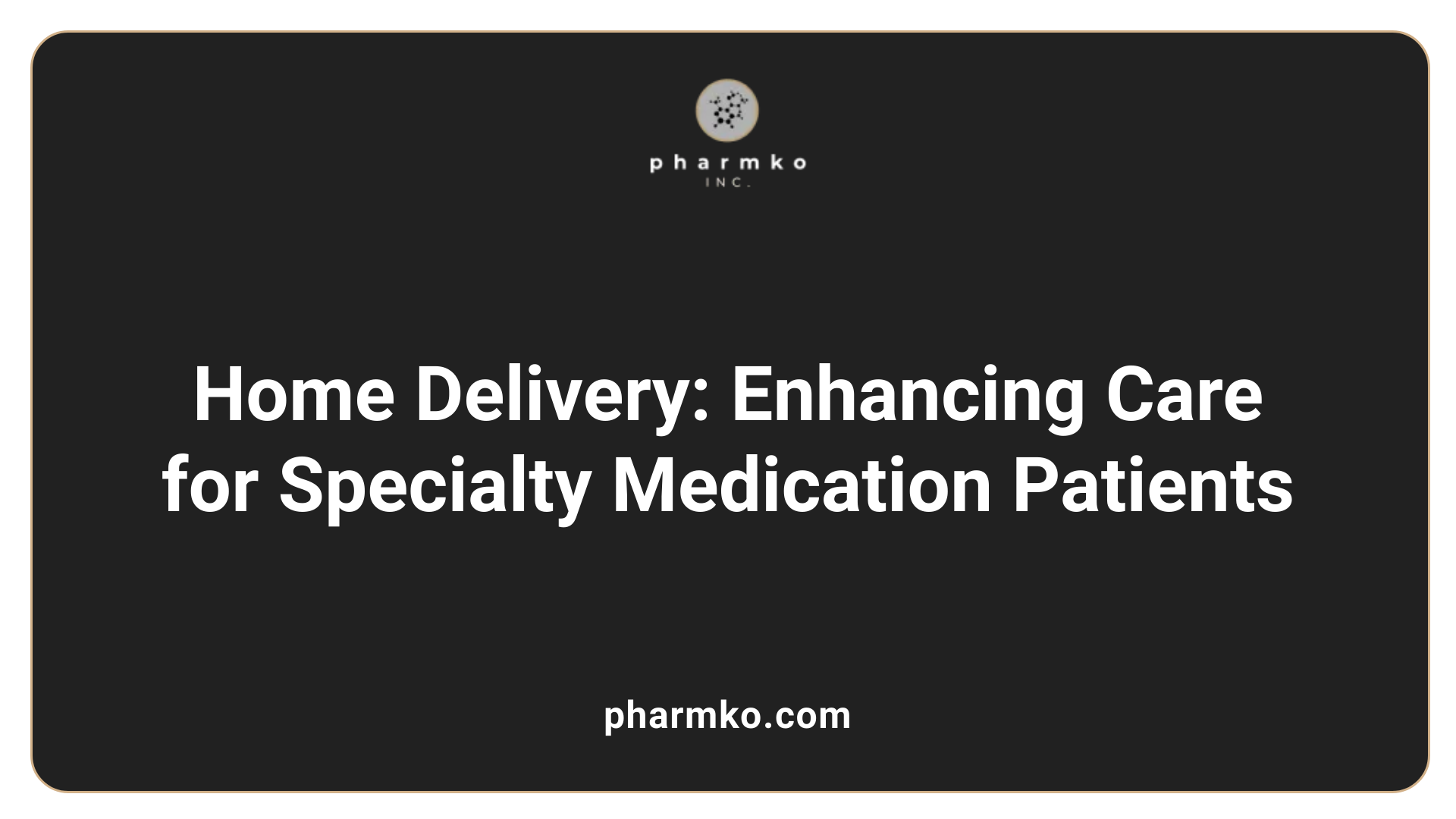Specialty medications at home
Understanding the Shift to Home-Based Specialty Medication
Specialty medications play a crucial role in managing complex and chronic health conditions. These drugs, often biological or injectable, require specific handling and administration, posing challenges in accessing them through traditional pharmacy channels. As the healthcare landscape evolves, home delivery of specialty medications emerges as a convenient and comprehensive solution for many patients. This article explores the essentials of obtaining and managing specialty medications at home, considering the benefits, processes, and considerations for patients and caregivers alike.
Defining Specialty Drugs and Their Insurance Implications

What constitutes a specialty drug?
Specialty drugs are typically high-cost medications used for managing complex chronic conditions such as cancer, rheumatoid arthritis, and multiple sclerosis. These prescriptions may be injectable or oral and often necessitate special handling due to their unique storage or administration requirements. Given their price point—often exceeding $670 for a 30-day supply—specialty drugs significantly contribute to overall healthcare expenditure, despite being utilized by a relatively small patient population.
Insurance categorization and implications
The classification of specialty drugs varies by insurance policy. They may fall under the medical benefit for medications that must be administered by a healthcare professional, or under the pharmacy benefit when patients can self-administer them at home. Each insurance plan can apply different cost-sharing structures, including specific tiers that influence co-pay amounts or percentage costs associated with the drugs.
Increased costs might be imposed for specialty drugs categorized under tier IV or similar high-cost tiers, leading to significant out-of-pocket expenses for patients. Regulations in some states may limit these costs, while pharmaceutical manufacturers often provide assistance programs to enhance patient access.
Out-of-pocket costs and assistance programs
When patients are prescribed specialty drugs, their financial burden can vary. Some insurance plans offer no co-pay for these medications, thereby reducing barriers to access. However, navigating formulary restrictions, step-therapy requirements, and copay accumulators can complicate access.
Patients should explore all available resources, including manufacturer assistance programs designed to alleviate financial pressures, ensuring they can receive the critical medications necessary for managing their health conditions efficiently.
Comprehensive Care Through Home Delivery Services

Overview of Specialty Pharmacy Home Delivery
Specialty drugs often treat complex, chronic conditions and are usually self-administered. To enhance patient care, many specialty pharmacies offer home delivery services, ensuring medications reach patients directly at their residences. This model allows individuals to avoid unnecessary trips to pharmacies, addressing the unique storage and handling requirements that many specialty medications demand.
Accessibility and Patient Support Services
Home delivery services like those from Accredo provide not only the medications but also critical support. Patients have 24/7 access to specialty-trained pharmacists and can receive condition-specific assistance. Free shipping and the provision of necessary administration supplies are added benefits that mitigate financial burdens.
Additionally, patients may receive comprehensive training from healthcare providers on how to properly manage their medications, ensuring adherence and effective treatment. This level of patient education is vital to navigating the complexities of specialty drug therapy at home.
Provider Options and Quality of Care
Patients have the opportunity to select from various specialty pharmacies, including CVS Caremark and options specific to their insurance, such as BCBSTX and HealthPartners. Each provider emphasizes quality care and ensures timely delivery of medications, which may require close communication and careful planning around potential shipping delays. Overall, specialty pharmacy home delivery stands as a vital resource for those managing serious health conditions from the comfort of their homes.
Navigating Coverage and Coordination for Specialty Medications

Understanding Pharmacy Benefit Structures
Specialty medications are often structured under various pharmacy benefits, which may include both pharmacy benefits and medical benefits. Under the pharmacy benefit, self-administered specialty drugs are typically covered when prescribed and obtained from an in-network pharmacy or through specialty home delivery services. Conversely, physician-administered medications fall under medical benefits and might be provided in settings like outpatient facilities.
Potential Financial Implications and Support
Specialty medications can be quite costly, often exceeding $670 for a 30-day supply, and are classified into different tiers within the pharmacy benefit. For example, Tier IV usually involves the highest costs. Fortunately, some plans may help alleviate financial barriers; patients can access specialty drugs without incurring co-payments, and free shipping services are frequently offered. Notably, the coverage complexities may include formulary restrictions and step therapy, impacting overall accessibility and costs for patients.
Care Coordination Services
Effective care coordination is vital in navigating specialty medication management. Specialty pharmacies, such as Accredo and CVS Caremark, ensure that patients receive personalized support through clinical management programs. These services include training for self-administration, 24/7 access to trained pharmacists, and condition-specific support. Communication is crucial; patients should confirm details like medication delivery and necessary supplies well in advance to ensure seamless therapy at home.
Practical Tips for Managing Specialty Medications at Home

What is a home medication list?
A Home Medication List is a vital document that provides a comprehensive record of all medications a patient is taking, including prescription drugs, over-the-counter medications, medicated creams, vitamins, and supplements. This list facilitates better communication between patients and healthcare providers, helping to prevent adverse drug reactions by identifying potential interactions with new prescriptions. It is essential for streamlining medical appointments, allowing healthcare teams to focus more on health discussions rather than recalling medications from memory. In emergencies, an accessible medication list gives medical professionals critical information about a patient's current treatment. Regularly updating the list and bringing it to all medical appointments can significantly enhance the quality of care received.
Essential supplies and considerations
When managing specialty medications at home, it's crucial to have the right supplies on hand. Here are some considerations:
- Injection supplies : If the medication is injectable, ensure you have syringes, alcohol wipes, and appropriate disposal containers.
- Storage requirements : Some specialty drugs have specific storage needs, often requiring refrigeration. Always check the labels or pharmacy guidelines.
- Refill reminders : Use calendar alerts or smartphone apps to set reminders for medication refills at least a week in advance.
Effective communication with pharmacies
Maintaining open lines of communication with your pharmacy is essential for successful medication management. Here are some tips:
- Preferred contact methods : Inform the pharmacy of your preferred way to be contacted about prescription updates.
- Shipping details : Ask about delivery timing, tracking options, and whether signature is needed for shipment.
- Emergency planning : Prepare for potential shipping disruptions by factoring in severe weather or travel schedules, ensuring you have a plan in place to manage timely medication delivery.
Ensuring Accessibility and Support with Specialty Pharmacy Programs

Role of specialty pharmacies in patient healthcare
Specialty pharmacies play a crucial role in managing the complexities associated with specialty medications. These medications are often high-cost and tailored for chronic conditions, such as cancer or rheumatoid arthritis. A notable example is Humira (adalimumab) , a biologic that treats autoimmune diseases by targeting inflammatory processes in the body.
Due to their unique requirements, specialty medications are typically not available at conventional retail pharmacies. They necessitate special handling, trained specialists, and often require an in-network pharmacy for prescription fulfillment, ensuring that patients have access to the proper resources for their treatment.
Training and consultation services
To enhance patient safety and efficacy of treatment, specialty pharmacies provide comprehensive training programs. Pharmacists skilled in specialty medications guide patients on proper administration techniques—whether injectable or oral—and offer crucial support throughout the care process. This includes monitoring for drug interactions and managing side effects, facilitating an educated approach to home therapy.
Also, many specialty pharmacies offer home delivery that caters to unique medication needs. This service allows patients to schedule delivery and manage their medications efficiently.
Medication adherence and delivery schedules
Adherence to prescribed medication schedules is vital for treatment success. Specialty pharmacies help patients stay on track by setting refill reminders and ensuring timely delivery of medications right to their homes, often at no additional charge. It's recommended that patients order refills about a week in advance to allow for processing and potential shipping delays, thereby minimizing disruptions in therapy.
Overall, these specialty pharmacy programs are designed to reduce financial barriers and provide essential support, illustrating their importance in comprehensive patient care.
The Path Forward: Empowering Patients With Specialty Medications at Home
Navigating the world of specialty medications can initially seem daunting, but with the right information, support, and planning, accessing these crucial treatments at home is increasingly manageable. By understanding your options in pharmacy services, insurance coverage, and home medication management, you can take proactive steps to ensure that your health needs are met with convenience and care. Staying informed empowers you not only to make the best choices for your health journey but also reinforces the critical partnership between you and healthcare providers, paving the way for optimal outcomes and continuity of care.
References
- Specialty Drugs | TRICARE
- Understanding Specialty Drug Coverage: Medical and Pharmacy ...
- Specialty Pharmacy Program | Department of Human Services
- Specialty Pharmacy Services | UNC Medical Center | Chapel Hill, NC
- Specialty Pharmacy Programs | Blue Cross and Blue Shield of Texas
- Specialty pharmacy - HealthPartners
- Specialty Pharmacy Program - Commercial - UHCprovider.com
- 7 Things to Know When Getting Specialty Medication Delivered by ...
- 10 Essential Family Medicines for Every Household
- A Prescription to Empowering Your Health Care and the Crucial ...













